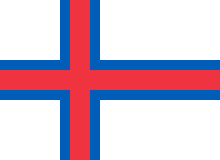
The economy of the Faroe Islands was the 166th largest in the world in 2014, having a nominal gross domestic product (GDP) of $2.613 billion per annum. GDP increased from DKK 8 billion in 1999, to 21 billion in 2019. The vast majority of Faroese exports, around 90%, consists of fishery products.

The flag of the Faroe Islands is an offset cross, representing Christianity. It is similar in design to other Nordic flags – a tradition set by the Dannebrog of Denmark, of which the Faroe Islands are an autonomous territory.
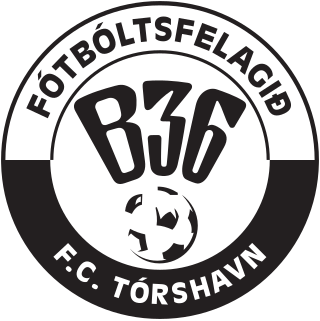
B36 Tórshavn is a Faroese football club based in the capital of Tórshavn, playing in the Faroe Islands Premier League, the top tier of Faroese football. B36 Tórshavn has always played its home games in Gundadalur.
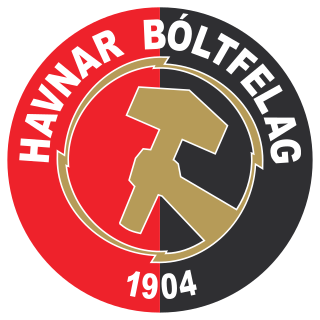
Havnar Bóltfelag is a Faroese professional football club, and is one of the oldest in the Faroe Islands. The club was founded in 1904, and is based in the city of Tórshavn. Home matches are played in Gundadalur and they compete in the Faroe Islands Premier League. The full name of the club is "Havnar Bóltfelag Tórshavn", which means "Port Football Club". The club was founded by port workers.
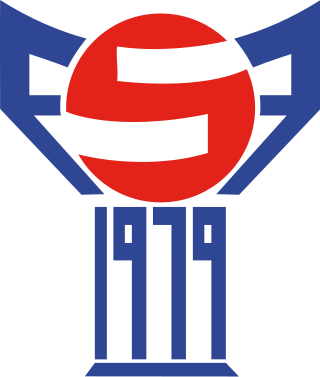
The Faroe Islands national football team represents the Faroe Islands in men's international football, and is governed by the Faroe Islands Football Association (FSF). The FSF became a member of FIFA in 1988 and UEFA in 1990 and represents the fourth-smallest UEFA country by population.
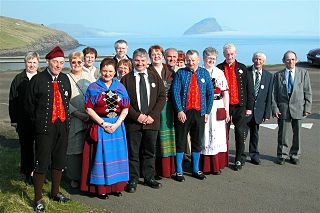
Faroese people or Faroe Islanders are an ethnic group native to the Faroe Islands. The Faroese are of mixed Norse and Gaelic origins. About 21,000 Faroese live in neighbouring countries, particularly in Denmark, Iceland and Norway. Most Faroese are citizens of the Kingdom of Denmark, in which the Faroe Islands are a constituent nation. The Faroese language is one of the North Germanic languages and is closely related to Icelandic and to western Norwegian varieties.
The Island Games are biennial international multi-sports events organised by the International Island Games Association (IIGA). Competitor teams each represent different island communities which are IIGA members. Currently, all competitor teams represent non-sovereign territories of European nations—some within European waters and some further overseas.
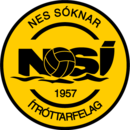
NSÍ Runavík is a Faroese football club, playing in Runavík on the island of Eysturoy. It was founded 24 March 1957. In 2003 NSÍ participated for the first time on a European stage.

The Faroe Islands Premier League is the top level of football in the Faroe Islands. It was founded in 1942 as Meistaradeildin, and it is played in current format since 2005, when Premier League replaced 1. deild as the country's top football division. The league is organised by the Faroe Islands Football Association.
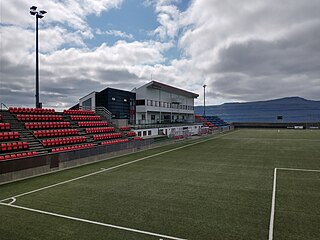
Svangaskarð, also referred to as Tofta Leikvøllur, is a multi-purpose stadium in Toftir, Faroe Islands with two football fields and a sports arena for athletics around the lower field. It is currently used mostly for football matches. The stadium holds 6,000 people. It was the sole home ground of the Faroe Islands national football team from 1991 and until the Tórsvøllur Stadium was built in the capital Tórshavn in 1999 and is still occasionally used for international football matches.

Klaksvíkar Ítróttarfelag, commonly abbreviated to KÍ and also known as KÍ Klaksvík, is a Faroese professional football club based in Klaksvík. The club was founded in 1904 and is one of the most successful Faroese football clubs, having won the Faroe Islands Premier League twenty-one times and the Faroe Islands Cup six times. The club wears blue and white and plays matches at the Við Djúpumýrar stadium.

The Danish Realm, officially the Kingdom of Denmark, or simply Denmark, is a sovereign state consisting of a collection of constituent territories united by the Constitutional Act, which applies to the entire territory. It consists of metropolitan Denmark—the kingdom's territory in continental Europe and sometimes called "Denmark proper" —and the realm's two autonomous regions: the Faroe Islands in the North Atlantic and Greenland in North America. The relationship between the three parts of the Kingdom is known as Rigsfællesskabet.

The Faroe Islands women's national football team represents the Faroe Islands in women's association football and is controlled by the Faroe Islands Football Association (FSF), the governing body of all football in the Faroe Islands. The FSF became a member of the International Federation of Association Football (FIFA) in 1988 and Union of European Football Associations (UEFA) in 1990. By population, it remains the fourth smallest member of UEFA, which encompasses the countries of Europe. The women's team played their first FIFA-sanctioned international match in 1995 and have never advanced to the finals of the FIFA Women's World Cup or UEFA Women's Championship. They took part in the Island Games in 2001, 2003 and 2005 and won all three tournaments, as well as appearing at the 2010 edition of the Algarve Cup. In the Faroe Islands, the team is known as the Kvinnulandsliðið.

The Faroe or Faeroe Islands, or simply the Faroes, are an archipelago in the North Atlantic Ocean and an autonomous territory of the Kingdom of Denmark. The official language of the country is Faroese, which is closely related to and partially mutually intelligible with Icelandic.

Being part of the Kingdom of Denmark, the foreign relations of Faroe Islands are handled in cooperation with the Danish government and Government of Faroe Islands.
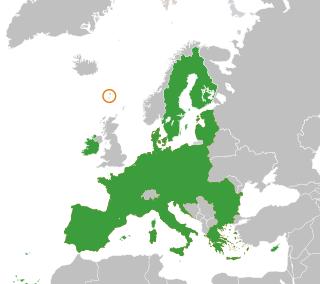
The Faroe Islands, a self-governing nation within the Kingdom of Denmark, is not part of the EU, as explicitly asserted by both Rome treaties.
1942 Meistaradeildin was the inaugural season of Meistaradeildin, the top tier of the Faroese football league system. It was performed in knockout rounds rather than in a league format. KÍ Klaksvík defeated TB Tvøroyri by 4–1 in the championship final.

The Faroe Islands national football team represents the Faroe Islands in association football and is controlled by the Faroe Islands Football Association (FSF), the governing body of the sport in the country. It competes as a member of the Union of European Football Associations (UEFA), which encompasses the countries of Europe. Organised football has been played in the country since the 19th century; Tvøroyrar Bóltfelag was its first club, founded in 1892. Initially, clubs played friendlies to determine the winner of an unofficial championship, with matches being contested home and away, depending on the weather and the state of the generally uneven grass pitches. The Faroe Islands Sports Association was formed in 1939, and three years later a national league was created. Cup competitions were introduced in 1955 before the FSF was founded on 13 January 1979.
The 2019 Faroe Islands Premier League was the 77th season of top-tier football in the Faroe Islands and the 15th under the current format.
